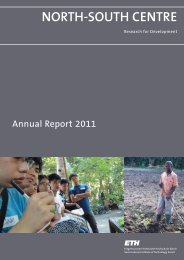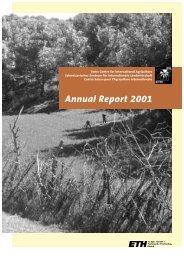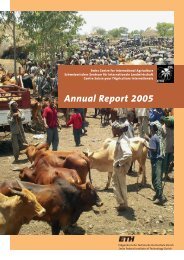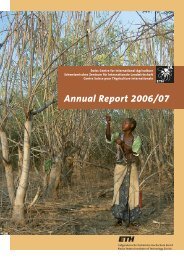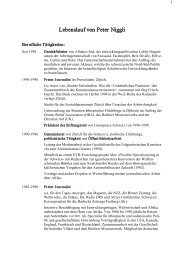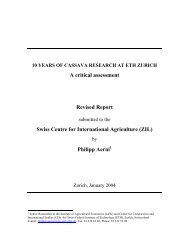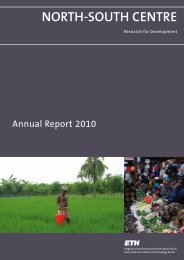NORTH-SOUTH CENTRE - ETH - North-South Centre North-South ...
NORTH-SOUTH CENTRE - ETH - North-South Centre North-South ...
NORTH-SOUTH CENTRE - ETH - North-South Centre North-South ...
Create successful ePaper yourself
Turn your PDF publications into a flip-book with our unique Google optimized e-Paper software.
Behavioural heterogeneity<br />
and human cooperation<br />
Maintaining large-scale cooperation requires incentives to<br />
overcome cooperation dilemmas in which freeriders enjoy<br />
public goods created by others without bearing the costs.<br />
Literature suggests (i) that conditional cooperation and<br />
costly punishment can stabilise cooperation, and (ii) that<br />
group selection based on culture provides larger scope for<br />
the evolution of these traits. However, most evidence on the<br />
former remains a major empirical challenge when applied<br />
in the real world. Evaluation of the latter could be improved<br />
by measuring culture through behavioural experiments and<br />
by estimating cultural differentiation among neighbouring<br />
groups of small-scale societies. In this study, we employed<br />
a variety of behavioural experiments, household questionnaires,<br />
and community surveys to measure these behaviours<br />
as well as other factors, and then study their effect<br />
on the outcomes of forest commons management. The<br />
study area covered 49 groups of the Bale Oromo people in<br />
Ethiopia.<br />
Our results show that high shares of conditional cooperators<br />
in a group have a significantly positive effect on the<br />
outcomes, even after controlling for conventional factors.<br />
Costly monitoring is a key mechanism by which conditional<br />
cooperators sustain cooperation. Our preliminary investigations<br />
further show that freely conferred deference on the<br />
group leader partially accounts for group level differences in<br />
conditional cooperation. The investigations also show that<br />
cultural group selection, as estimated through cultural differentiation<br />
among 77 pairs of neighbouring small-scale<br />
societies, provides scope for the evolution of costly cooperative<br />
traits. A detailed examination of the punishment<br />
behaviour of a group leader in response to deviations from<br />
co-operation norms reveals substantial variations. Normdriven<br />
leaders who explicitly punish deviations from the<br />
conditional cooperation norm have a positive but insignificant<br />
effect on the outcomes. In contrast, spiteful leaders<br />
who punish cooperators have a significantly negative effect.<br />
Furthermore, we investigated how behavioural heterogeneity<br />
and beliefs interact in voluntary cooperation. We<br />
find that most Bale Oromo conditional cooperators exhibit<br />
‘‘altruistic’’ bias, contributing slightly more than the partner<br />
player does. This challenges the hypothesis that imperfect<br />
conditional cooperation causes decline in cooperation over<br />
time. Our results reveal that behavioural heterogeneity is<br />
a highly significant predictor of voluntary cooperation and<br />
that beliefs have a positive effect on cooperation only when<br />
a player is a conditional cooperator.<br />
76<br />
Research fellow<br />
Devesh Rustagi, <strong>ETH</strong> Zurich, Switzerland<br />
Supervisors<br />
Stefanie Engel, <strong>ETH</strong> Zurich, Switzerland;<br />
Michael Kosfeld, University of Frankfurt, Germany<br />
Capacity development<br />
Research fellowships<br />
Collaborators<br />
Bruce Cambell, CIFOR, Indonesia;<br />
Franz Gatzweiler and Günther Manske,<br />
ZEF, University of Bonn, Germany;<br />
Martin Neumann, GTZ Sustainable Utilization of Natural<br />
Resources for Food Security (SUN), Oromia, Ethiopia;<br />
Gurara Gebissa, Regional State of Oromia Forest<br />
Enterprises Supervising Agency, Ethiopia<br />
Duration<br />
September 2008 – December 2009<br />
Economic experiments used to analyse the prevalence<br />
of social preferences in Ethiopian communities




